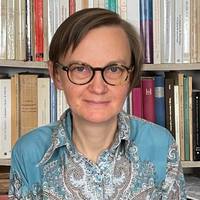- Philosophy, Critical Theory, Medieval History, History of Philosophy, History of theology, Iconoclastic Controversy and Iconophilia, and 7 moreControversy, History Of Emotions, Codicology of medieval manuscripts, Carolingian manuscripts, Ratramnus of Corbie, Paschasius Radbertus, and Eucharistic Theologyedit
Research Interests:
DIMANCHE 3 OCTOBRE [Sous réserve de la situation sanitaire] 9 h 45 | Visite de l'oratoire de Germigny-des-Près Visite commentée par Christian SAPIN (Artehis, CNRS) 14 heures-16 heures | Visites du dépôt lapidaire de l'abbaye, du centre... more
DIMANCHE 3 OCTOBRE [Sous réserve de la situation sanitaire] 9 h 45 | Visite de l'oratoire de Germigny-des-Près Visite commentée par Christian SAPIN (Artehis, CNRS) 14 heures-16 heures | Visites du dépôt lapidaire de l'abbaye, du centre d'interprétation du Belvédère et de l'abbatiale Notre-Dame Création : Serge Pinche (CIHAM) | Crédit couverture : BnF (Latin 9380, folio 250r) PROGRAMME VISITES ORGANISATION Caroline CHEVALIER-ROYET Kristina MITALAITÉ Sumi SHIMAHARA Claire TIGNOLET avec le soutien de avec les interventions de Gaëlle BOSSEMAN Caroline CHEVALIER-ROYET Marie-Céline ISAÏA
Un tombeau de papier pour Théodulf d'Orléans
Research Interests:
woRds: social memory, damnatio memoriae, veneration of images, Francs, religious cult. socialinė atmintis Viii a. FRankų kontRoVeRsijoje dėl atVaizdų kulto social memory in the 8 th century Frankish controversy concerning the cult of... more
woRds: social memory, damnatio memoriae, veneration of images, Francs, religious cult. socialinė atmintis Viii a. FRankų kontRoVeRsijoje dėl atVaizdų kulto social memory in the 8 th century Frankish controversy concerning the cult of images summaRy this article focuses on social memory as religous memory in the carolingian late eigth century. in latin christian culture Greek icons and religious images were understood in terms of sacred memory. in his treatise Opus Caroli Regis, written in opposition to the Proceedings of the second council of nicea (787), theodulf of orleans harshly criticized the condemnation of the participants of the iconoclast council of Hiereia (754). He characterized the anathematizing of their spiritual forefathers at the second council of nicea as a damnatio memoriae, that is, a kind of dishonouring that should not be countenanced by christian society. in this way theodulf sought to expose the Greeks' corruption of social memory arising from their cult of images. santRauka straipsnyje analizuojama socialinės atminties sąvoka Viii a. pabaigos frankų kontroversijoje dėl atvaizdų garbinimo ir laužymo. ikona ir materialus atvaizdas lotynų krikščioniškoje kultūroje buvo apibrėžiami kaip atminties forma. teodulfas iš orleano traktate Opus Caroli Regis atmetė antrojo nikėjos suvažiavimo (787) nutarimą grąžinti ikonų garbinimą. jis itin griežtai kritikavo nikėjos Bažnyčios tėvų paskelbtą Hie-rėjos ikonoklastų sinodo (754) pasmerkimą, kurį jis apibrėžia kaip dvasinių tėvų prakeikimą ar damnatio memoriae. Retoriškai ir meistriškai konstruojamame autoriaus diskurse tėvų prakeikimas buvo parodytas kaip graikų korumpuotos socialinės atminties atspindys. mirusiųjų prakeikimas čia suvokiamas kaip ne-leistina krikščioniško kulto forma, kuri atsispindi taip pat per atvaizdų garbinimą, kurį pasmerkė frankai. https://doi.org/10.24101/logos.2020.71 Gauta 2020 07 22 kRistina mitalaitė lietuvos kultūros tyrimų institutas, lietuva lithuanian culture Research institute, lithuania
During the first carolingian period, the creed, defined as symbolum, not only signifies the political and ecclesiological unity of Charles the Great’s kingdom and then empire, but it is also a structuring element of theological treaties.... more
During the first carolingian period, the creed, defined as symbolum, not only signifies the political and ecclesiological unity of Charles the Great’s kingdom and then empire, but it is also a structuring element of theological treaties. The collection of creeds, initially included in Dagulf’s manuscript – written as a present to Hadrian I – is widely copied and «corrected » by Carolingians. These amendments express the desire to defend faith against the new « heresies » like either adoptianism or Greek pneumatology.
The knowledge of the Greek by the Carolingians was well studied by the modern scholars. This article focusses on the third generation’s intellectuals from this period, their attitude towards this language and the ways it was used in the... more
The knowledge of the Greek by the Carolingians was well studied by the modern scholars. This article focusses on the third generation’s intellectuals from this period, their attitude towards this language and the ways it was used in the classrooms. In the light of (the) negative view of the Greek knowledge by some of his contemporaries, Sedulius Scottus appears to be an intellectual interested in the Greek thought that he collected from the different Latin sources like Macrobius for instance. His awareness of the definition of the soul by Platon leads him to state some philosophical ideas as an active principle for the essence in the things.
The authors are : David Anzalone, Marta Borgo, Marc Millais, Kristina Mitalaité, Jean-Christophe de Nadaï, Adriano Oliva
